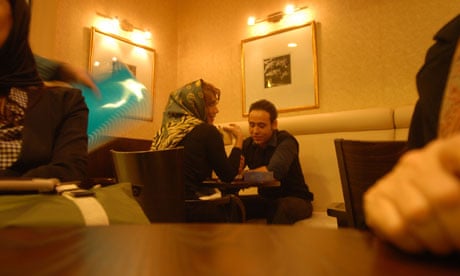As the June presidential election in Iran draws near, authorities have
stepped up political surveillance by ordering coffee shop owners to install cameras on their premises and turn over the recordings on demand.
Cameras have proliferated in Tehran coffee shops since last summer. "Most people thought they were part of the security systems installed by owners to protect against theft," one Tehrani said. However the cameras are now required to be on during work hours and police have demanded access to the tapes, according to several business owners.
The practice became public when Café Prague, one of the most popular coffee houses in Tehran, closed down last week after its owners refused authorities' orders to install a video system. Café Prague, a stone's throw from Tehran University in the heart of the capital, has been a sanctuary for students, activists and young intellectuals since its opening in 2009.
A few weeks ago, Tehran's morality police and security authorities told the café's proprietors to install a minimum of four surveillance cameras on the premises as part of state efforts to tighten civic monitoring and security. The owners decided they would not do so. Recognising that this would result in further harassment and eventual closure, they shut down the cafe themselves to protest against the new surveillance measures.
"We always knew this day would come and, in the midst of Tehran's grimy winter, our end has finally arrived in spite of our many attempts to stay afloat," read a statement posted on the Café Prague Facebook page.
"But as much as it pains us and as much as we will miss our friends and all of you who stood by our side in the past four years, we take comfort in knowing that we at least didn't let Big Brother's glass eyes scan and record our every step, minute and memory from dawn till dusk."
The café's closure is a significant loss for Tehran's academic and cultural life. During its short existence, Café Prague offered much more than just coffee and free wi-fi; it played host to a number of social and political events, from photo exhibitions supporting local artists to music performances and vibrant left-leaning discussions on workers' rights.
"I have four years' worth of memories in that café," said Amir Hossein, a photographer. "I am sad that I didn't spend more time there. Café Prague wasn't just a café; it was like home, a safe haven for us to forget all our daily troubles and burden."
From the ninth century, the Iranian coffeehouse was a place that poets, artists and dervishes could gather without fear of harassment by royal deputies or local authorities. In the modern era, dissident café culture in Tehran stretches back some 85 years to the time when the celebrated Café Naderi - much like Café de Flore and Les Deux Magots in Paris - became a magnet for the intellectual elite. For decades it was frequented by prominent literary figures such as Sadegh Hedayat, Jalal al-Ahmad, Simin Daneshvar and Nima Yooshij.
After the 1979 revolution, the government closed many coffee shops, declaring them part of the "western cultural onslaught". Harking back to those early days of the Islamic Republic, some conservative political and religious leaders have taken a stricter line against "foreign culture" in recent years, promoting plans to "Islamicise" universities' liberal arts curricula and once again shutter venues that facilitate socialising and the exchange of ideas unbound from customary constraints. Last July, more than 87 cafés and restaurants in a single district of the capital were reportedly raided for defying "Islamic values."
The crowds at coffee shops in Iran tend to be young. They are the site of many couples' first dates, a place where they can be free of the inhibitions imposed by the morality police or parental supervision. Groups of young people gather as well, for everything from discussions after class at university to birthday celebrations.
"The decision to force this or that place to follow the rules or shut down also signals another trend at Tehran's coffee shops," an observer told Tehran Bureau. "An increasing number of their patrons use coffee shops to discuss politics - something the government does not appreciate."

Comments (…)
Sign in or create your Guardian account to join the discussion